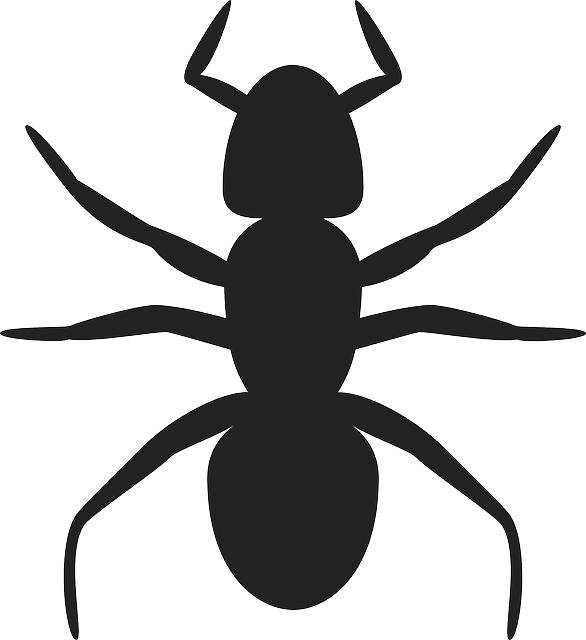Ants, highly organized social insects, play a crucial role in their colony's survival through distinct behaviors like scent trail communication and common entry points. Understanding these habits is essential for developing effective eco-friendly ant control strategies. By observing ant activity, pest control experts can implement customized plans that seal access points, maintain cleanliness, and remove food sources to deter ants without harmful chemicals. Eco-friendly methods include repellents, organic barriers, and non-toxic baits, ensuring the well-being of loved ones, the environment, and contributing to ecological preservation. Tailored ant prevention strategies for homes involve understanding local species, regular inspections, natural barriers, and clean environments. For businesses, customized prevention plans using eco-friendly methods maintain hygienic and productive spaces without compromising health or safety standards.
“Ant infestations can disrupt homes and businesses, but tailored prevention plans offer an effective solution. This comprehensive guide explores personalized strategies to combat ants naturally. We delve into understanding ant behaviors and identifying entry points, highlighting the advantages of eco-friendly ant control methods. For homeowners and commercial properties alike, learn how to develop and implement customized plans that eliminate ants without harmful chemicals. Discover the power of natural solutions for a pest-free environment.”
Understanding Ant Behaviors and Entry Points
Ants are highly organized creatures with distinct behaviors that play a crucial role in their colony’s survival and expansion. Understanding their habits is essential when creating an effective ant prevention strategy, especially for eco-friendly ant control methods. These social insects follow specific trails, using pheromones to communicate and mark paths to food sources. Identifying these scent trails can help professionals locate entry points into homes and businesses, where ants may be accessing hidden food sources.
By observing ant activity and studying their behaviors, pest control experts can pinpoint problem areas and develop customized plans. Common entry points include gaps around pipes, utility lines, windowsills, doors, and cracks in walls or foundations. Implementing eco-friendly measures like sealing these access points with appropriate materials, maintaining cleanliness, and removing potential food sources goes a long way in deterring ants without resorting to harmful chemicals.
Benefits of Eco-Friendly Ant Control Methods
Using eco-friendly ant control methods offers a multitude of benefits for both homes and businesses. Unlike traditional chemical-based solutions, these methods prioritize safety and sustainability, making them ideal for environments where children, pets, and wildlife are present. By employing natural repellents, organic barriers, and non-toxic baits, you can effectively manage ant infestations without exposing your loved ones or the ecosystem to harmful substances.
Moreover, eco-friendly practices contribute to a healthier and more balanced ecosystem. They minimize the risk of water contamination, protect beneficial insects, and preserve biodiversity by avoiding chemicals that can disrupt natural habitats. By choosing these methods, businesses can demonstrate their commitment to environmental responsibility, enhancing their reputation among ecologically conscious customers and partners.
Developing a Customized Ant Prevention Plan for Homes
Developing a customized ant prevention plan for your home is an effective way to ensure a pest-free environment while promoting eco-friendly practices. Start by identifying the types of ants commonly found in your area, as different species have distinct behaviors and preferences. For example, fire ants are attracted to moisture and food sources, so eliminating these can be a significant step in prevention. Regular inspections are key; check for signs of ant activity, such as trails or small holes, and address any potential entry points.
Consider natural barriers and repellents like citrus oils, cinnamon, or diatomaceous earth, which can deter ants without harmful chemicals. Maintaining a clean and clutter-free space, especially in kitchens, is vital. Store food in airtight containers, promptly clean spills, and regularly vacuum to reduce ant attraction. A combination of these methods will create an impenetrable defense, allowing you to enjoy your home without unwanted visitors, while also contributing to a greener, eco-conscious approach to pest control.
Implementing Effective Ant Management Strategies in Businesses
Implementing effective ant management strategies is paramount for businesses aiming to maintain a hygienic and productive environment. Unlike residential settings, commercial spaces often present unique challenges due to their size, high foot traffic, and diverse food sources attracting ants. Customized ant prevention plans tailored to these specific needs are crucial. Eco-friendly ant control methods offer a sustainable solution without compromising health or safety standards.
Such strategies involve regular inspections, identifying and sealing entry points, maintaining cleanliness, and utilizing natural repellents. Professional pest control services specializing in eco-friendly practices can implement targeted treatments using non-toxic baits and essential oils. By adopting these proactive measures, businesses can effectively deter ant infestations, ensuring a welcoming atmosphere for both employees and customers.
In conclusion, implementing customized ant prevention plans tailored to specific environments—whether homes or businesses—is key to effective, long-lasting protection. By understanding ant behaviors and entry points, and embracing eco-friendly ant control methods, we can achieve substantial benefits while minimizing environmental impact. These strategies empower us to create safer, more harmonious spaces for both residents and workers alike.
